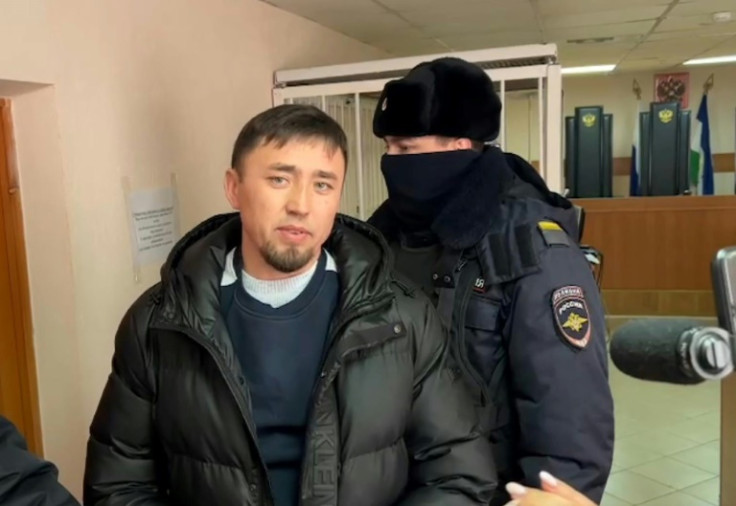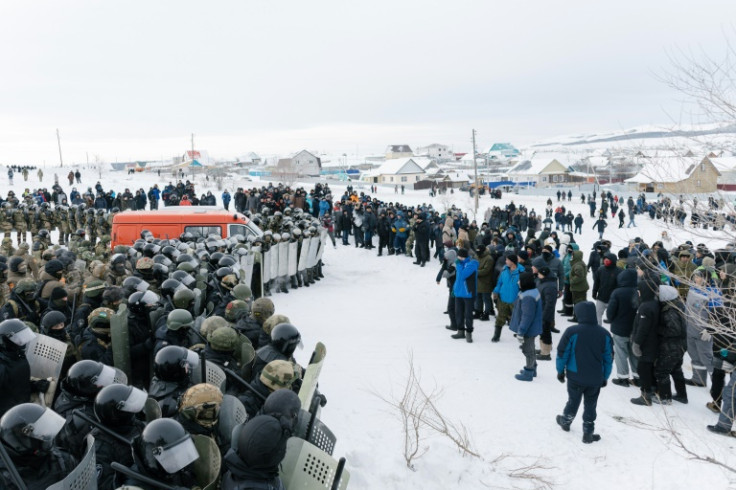Repression Grips Remote Russian Region Months After Shock Protests

Since a Russian court in January sent his older brother, environmental activist Fail Alsynov, to prison for four years, Idel says he has lived in "fear of the unknown".
Fail's sentencing in the central Bashkortostan republic triggered some of the largest protests Russia has seen since sending troops into Ukraine, with thousands braving sub-zero temperatures and a brutal police response to voice their anger.
He was jailed for "inciting hatred" in a speech against mining, but many saw it as retribution for irking powerful local leaders.
In the months since, Bashkortostan has cracked down hard on those who were arrested for the rallies.
"You look into the future and nothing is clear," Idel Alsynov, 30, told AFP during an interview at the end of April, via an encrypted messaging app.
The protests shocked observers, coming as President Vladimir Putin was running for another Kremlin term in a vote meant to symbolise unity behind the Ukraine offensive.
Moscow has effectively outlawed dissent and protest under strict anti-demonstration and military censorship laws.
Bashkortostan, which has a large Turkic-speaking Bashkir minority, has sent a disproportionately high number of men to fight in Ukraine, multiple independent studies have shown.
In some opposition circles, the demonstrations were portrayed as the result of pent-up public disapproval of the military campaign.
Although Fail Alsynov had denounced the offensive and criticised Moscow's mobilisation drive, Idel insists his brother is primarily concerned with the protection of natural sites and Bashkir culture.
Fail, who authorities have labelled an "extremist", was accused of using racist language in a speech on the pollution of gold mines in a village in the Baymak district, seven hours' drive from the regional capital Ufa.
He said he had been mistranslated.
Police used tear gas to disperse the thousands who came to support Alsynov at his trial, beating many in street clashes as temperatures plunged to around -20 Celsius (-4 Fahrenheit).
At the time, the Kremlin downplayed the events.
Putin's spokesman Dmitry Peskov said there was "no mass unrest or mass protests".
But in the aftermath, some 80 people have been charged with taking part in "mass unrest" -- a crime that can be punishable by years in prison.
According to several rights groups, two people died in custody in obscure conditions and another suffered a spinal fracture.
When an AFP reporter met Idel Alsynov in Ufa in late January, he was scared, but determined to defend his brother.
"Fail, as a real son of the Bashkir nation, of course always worried for his nation, his language and the history of his nation," he said.
Speaking near a statue of Salavat Yulaev, a Bashkir national hero and resistance fighter against Tsarist Russia, Idel interrupted the interview to call a relative of somebody who had just been arrested.
He said he was stunned by the scale of the repression.
"The people who came to defend Fail did not imagine that it would all end in mass arrests," Idel said.
Regional leader Radiy Khabirov said only "extremists" and "separatists" were being rounded up.
But local activists and those who protested are living in a climate of fear and intimidation.
After meeting Idel in Ufa, two unknown men followed an AFP reporter to his hotel room, harassing, filming and threatening him.
Footage of the encounter was published on a pro-offensive Telegram channel.
Idel Alsynov also told AFP he rejected accusations that his brother wanted Bashkortostan to break away from Russia.
One of Fail's former allies, Ruslan Gabbassov -- labelled a "foreign agent" and accused of terrorism in Russia -- is an outspoken backer of Bashkir separatism from exile.
The claims are particularly sensitive in Russia, which fought brutal campaigns to quash independence movements in Chechnya in the 1990s and early 2000s.
Fail "fought for the good of our republic at the heart of our great Russia" and "never thought that the Bashkirs are better or superior," Idel said.
Speaking on condition of anonymity, one Bashkir activist whose husband was arrested in January told AFP that Gabbassov was sabotaging those promoting Bashkir culture and language at home and "sowing discord" from abroad.
Many of Fail Alsynov's backers said his arrest was local leader Khabirov exacting revenge.
In 2020, Alsynov had led a campaign that successfully appealed to Putin to preserve a sacred hill -- the Kushtau -- from a mining development.
It was one of the biggest environmental protests in Russia for years -- and seen as a national humiliation for Khabirov.
Appealing to the president is a tradition from the Russian empire, when citizens would petition the Tsar over the heads of local leaders.
Critics say the jilted Khabirov has sought revenge ever since.
Alsynov's opposition to the Ukraine offensive -- while not the main factor in the arrest and sentencing -- is believed to have worsened his case.
According to research by the BBC and Mediazona -- also labelled a "foreign agent" -- at least 1,856 soldiers from Bashkortostan have died in Ukraine.
In autumn 2022, Fail Alsynov was fined for a social media post criticising the fact that Bashkir men were dying in Ukraine.
"This is not our war," he had said.



© Copyright AFP 2025. All rights reserved.





















